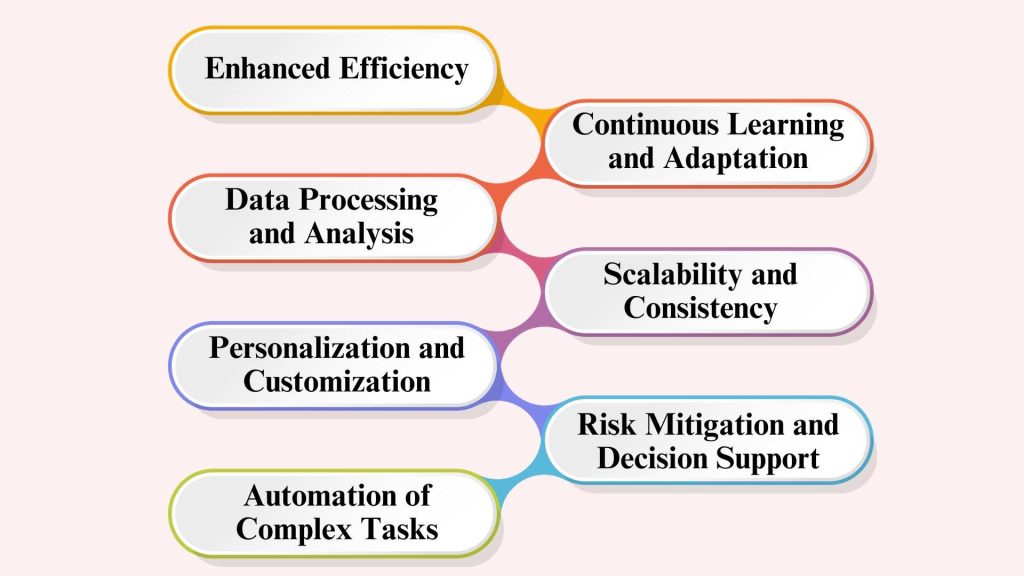
In today’s fast-paced business landscape, the integration of artificial intelligence (AI) into workflow automation is not merely a trend—it’s a transformative force. Companies are grappling with an overwhelming amount of data and an ever-increasing demand for efficiency.
As organizations strive to streamline operations and enhance productivity, AI stands out as a cornerstone technology. Imagine a world where mundane tasks are effortlessly managed by intelligent systems, freeing up valuable human resources to focus on strategic initiatives.
This powerful shift not only propels companies into the future but also fosters innovation and adaptability. In this article, we will explore three key benefits of AI workflow automation, each unlocking new potentials for modern enterprises and reshaping how work gets done.
Enhanced Efficiency and Productivity

In the fast-paced world of modern business, enhanced efficiency and productivity stand as pivotal advantages of integrating AI workflow automation. Imagine a scenario where routine tasks—data entry, scheduling, and customer responses—are managed seamlessly by intelligent systems, freeing up human resources for higher-level strategic work.
This shift not only streamlines operations but also minimizes the chances of errors that often plague manual processes. For instance, automated workflows can swiftly analyze vast datasets to spot trends and insights that might take a human team weeks to uncover.
Moreover, the ability to operate around the clock without fatigue means that businesses can maintain consistent output, adapting quickly to changes and demands. As a result, companies can achieve remarkable scalability, respond to customer needs with unprecedented agility, and elevate overall performance to new heights.
It’s a transformative cycle: with better efficiency, staff morale rises, innovations flourish, and ultimately, the company propels itself toward greater success.
Improved Accuracy and Consistency

One of the standout advantages of AI workflow automation is its remarkable ability to enhance accuracy and consistency across various processes. Imagine a world where mundane tasks, from data entry to report generation, are executed with near-perfect precision, devoid of the errors that often plague human efforts.
Artificial Intelligence systems analyze vast amounts of data tirelessly, ensuring that each piece of information is processed uniformly, regardless of the volume or complexity. This consistency not only boosts the reliability of business operations but also frees up human employees to focus on more strategic, creative endeavors—tasks that require the nuanced touch of human intuition.
As a result, companies witness a significant reduction in mistakes, a smoother workflow, and ultimately, higher quality outputs that drive success in today’s competitive landscape.
Cost Reduction and Resource Optimization

In the age of digital transformation, AI workflow automation emerges as a game-changer in the relentless pursuit of cost reduction and resource optimization. By streamlining routine tasks and minimizing human error, companies can significantly lower operational costs while relocating resources to strategic initiatives.
Imagine a scenario where data entry, customer inquiries, and inventory management are seamlessly handled by intelligent algorithms, freeing up valuable employee time for innovation and creativity. Moreover, with real-time analytics and predictive modeling, businesses can make informed decisions that enhance efficiency and reduce waste.
The result? A leaner organization with a sharper competitive edge, where every penny is stretched further and every resource is deployed effectively. The potential is staggering; optimized workflows lead not just to savings, but to a transformative shift in how companies operate and thrive in a fast-paced market.
Conclusion
In conclusion, the integration of AI workflow automation into modern companies offers transformative benefits that can significantly enhance productivity, efficiency, and decision-making capabilities. By streamlining repetitive tasks, companies can allocate valuable human resources toward more strategic initiatives, ultimately driving innovation and growth.
Additionally, the ability of autonomous AI agents to analyze vast amounts of data in real-time empowers organizations to make informed decisions quickly, adapting to market changes with agility. As businesses continue to embrace these advancements, the potential for AI workflow automation to reshape the workplace landscape is both promising and essential for sustaining competitive advantage in today’s fast-paced environment.









